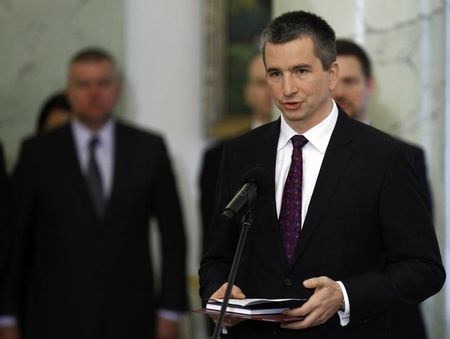Poland keeping ‘foot in door’ to euro zone membership – Finance Minister

By Marcin Goettig
WARSAW (Reuters) – Poland is keeping the door open to euro zone membership, but joining the common currency will not boost the country’s status because it is already a stable and developed economy, Finance Minister Mateusz Szczurek was quoted on Friday as saying.
Poland, which joined the European Union in 2004, is legally obliged to join the euro zone at some point. But it has not set a target date and says it needs to see the final shape of new euro zone institutions before it takes further steps towards adopting the common currency.
“In 2004 the euro zone and Poland were different. Since then the balance of benefits and costs from switching the currency has changed,” Szczurek told the wnp.pl website.
“Joining the euro zone in itself is no longer a trampoline to the status of a stable, developed economy – we have already become one,” he said.
“Adopting the euro will also not mean as significant a fall in interest rates as was earlier indicated. We are already financing ourselves more cheaply than euro zone countries with the same (credit) rating,” Szczurek said.
Poland has enjoyed years of strong economic growth since joining the EU, even during the global financial meltdown of 2008-09 and the euro zone debt crisis that began in 2010.
Several other former communist countries that also joined the EU in 2004, including Slovakia and Estonia, have already joined the euro, but Poland is much larger.
Szczurek said he could imagine a situation where Poland’s euro zone accession process would have to be accelerated for political reasons.
“If the conditions for using our strategy of ‘keeping a foot in the door’ change to such an extent that these doors start to crush our foot, that is if there is a need to maintain the position of Poland in Europe, then I would allow the possibility of re-evaluating this strategy,” Szczurek said.
POLITICS
“However, one cannot rule out a possibility (…) that the situation in the euro zone is so bad that the ‘political benefits’ (…) will not play a significant role,” he added.
Some analysts argue that euro zone membership would anchor Poland more firmly in Western institutions, increasing its security and political clout.
In March, Poland’s central bank governor Marek Belka said the crisis in neighbouring Ukraine made him more positive about the benefits for Poland of joining the euro.
But Prime Minister Donald Tusk then said Poland would not rush to join the euro zone just because of the crisis in Ukraine, where pro-Russian separatists are battling Kiev’s forces in the east of the country.
Poland also faces a domestic political obstacle to adopting the euro as it would need to amend its constitution, which now states that the zloty is its national currency.
Such a change would require a two-thirds majority in parliament, something Tusk’s centre-right government now lacks. Opinion polls show a majority of Poles oppose joining the euro.
Asked if Poland should enter the euro zone or not, Szczurek reiterated the government’s public position:
“Enter, but only when we are ready, when we meet the criteria in a sustainable way and when the euro zone passes effective institutional reforms.”
“We must be convinced that the changes in the European Union and the euro zone — including the banking union — will allow for an effective reaction in case of a crisis situation in the future,” Szczurek said.
(Editing by Gareth Jones)